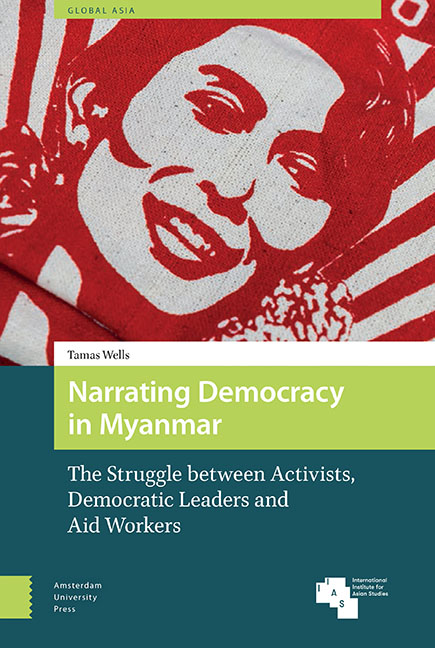Book contents
- Frontmatter
- Contents
- Abbreviations
- Acknowledgements
- Foreword
- 1 Introduction
- 2 Elucidating the Meaning of Democracy through Narrative
- 3 Toward the ‘Ocean of Democracy’?: The British Colonial Administration, the Thakin and Contests over Meanings of Democracy in late Colonial Burma
- 4 Burma after Independence: From Moral to ‘Disciplined’ Democracy
- 5 A liberal Narrative
- 6 A benevolence Narrative
- 7 An Equality Narrative
- 8 Exposing the Political use of Narratives
- 9 Beyond an ‘Ideal type’
- 10 Playing Different Games: Myanmar’s Future Challenges
- Index
4 - Burma after Independence: From Moral to ‘Disciplined’ Democracy
Published online by Cambridge University Press: 17 June 2021
- Frontmatter
- Contents
- Abbreviations
- Acknowledgements
- Foreword
- 1 Introduction
- 2 Elucidating the Meaning of Democracy through Narrative
- 3 Toward the ‘Ocean of Democracy’?: The British Colonial Administration, the Thakin and Contests over Meanings of Democracy in late Colonial Burma
- 4 Burma after Independence: From Moral to ‘Disciplined’ Democracy
- 5 A liberal Narrative
- 6 A benevolence Narrative
- 7 An Equality Narrative
- 8 Exposing the Political use of Narratives
- 9 Beyond an ‘Ideal type’
- 10 Playing Different Games: Myanmar’s Future Challenges
- Index
Summary
Abstract
By examining other examples of conceptual contest over the meaning of democracy in Myanmar's history, the fourth chapter follows through the periods of parliamentary and military rule in the twentieth century, and then through the recent transition to democracy. This highlights how key conceptual contests in Myanmar's history informed the contrasting ways democracy is understood and communicated amongst activists and democratic leaders today.
Keywords: Burma, U Nu, independence, Tatmadaw, socialist, disciplined Democracy
Following the end of the Second World War in 1945, British colonial resources in Southeast Asia were exhausted and the Burmese movement for independence gained momentum. After negotiations in London, British Prime Minister Attlee finally conceded that the British would grant Burma independence in 1948. The AFPFL convincingly won general elections in 1947 – to determine the composition of the future government of Burma – and Aung San was thrust into national leadership. Ironically though, while resisting British colonial rule, the formal institutions adopted in the new 1947 Constitution were largely structured around the British Westminster ‘prototype’ (Maung Maung Gyi 1983: 87).
This chapter examines the period from Burma's independence until the first political and economic liberalisations under the Thein Sein government from 2011. I first focus on the AFPFL leadership after independence and the ways in which, during the parliamentary period, meanings of democracy took a moral turn, focussing on the value of unity amidst the chaos of multiple civil wars and party division. I then examine the lurch to the military leadership under General Ne Win and the reaction against the perceived immaturity of parliamentary government. Finally, I highlight the emergence of democracy movement leaders, particularly Aung San Suu Kyi, and their reaction against the military assumptions of ‘disciplined democracy’ and a guardian role for the Tatmadaw. Overall, this chapter is not an attempt to construct a unitary history of Myanmar but rather to locate and uncover struggles over the meaning of democracy during these different periods and how they shape contemporary political uses of the word ‘democracy’.
- Type
- Chapter
- Information
- Narrating Democracy in MyanmarThe Struggle Between Activists, Democratic Leaders and Aid Workers, pp. 77 - 94Publisher: Amsterdam University PressPrint publication year: 2021



